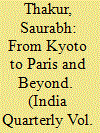| Srl | Item |
| 1 |
ID:
180238


|
|
|
|
|
| Summary/Abstract |
Anthropogenic climate change has emerged as the most disruptive socio-political issue in the last few decades. The Kyoto Protocol’s failure to curb the rising greenhouse gases emissions pushed the UNFCCC-led negotiations towards a more flexible, non-binding agreement at the Paris COP21 meeting in 2015. The Paris Agreement’s hybrid approach to climate change governance, where flexible measures like the nationally determined commitments are balanced against the ambition of limiting the global temperature within the two-degree range, ensured the emergence of an increasingly complex and multi-stakeholder climate change regime. The article outlines the roadmap of the transition from the top-down approach of Kyoto Protocol to the legally non-binding, bottom-up approaches adopted for the post-Paris phase. The article outlines the post-Paris developments in international climate politics, which hold long-term geopolitical and geoeconomic implications. The article focuses on the fundamental shifts and balances within the UNFCCC architecture and examines the four fundamental features of this transition—the interpretation of differentiation and common but differentiated responsibilities, the evolving role of emerging economies in the negotiations, the rising profile of non-party stakeholders in shaping the climate action strategies and the emergence of climate justice movements as an alternate site of climate action.
|
|
|
|
|
|
|
|
|
|
|
|
|
|
|
|
| 2 |
ID:
187142


|
|
|
|
|
| Summary/Abstract |
Seaports are an indispensable asset in interconnected and interdependent global supply chains. Their complex infrastructural and operational systems and critical foreland and hinterland networks make ports a vital nodal point in the economic progress of nations at large, and the coastal urban agglomerations in particular. These critical maritime assets are currently under threat from the disruptive impacts of anthropogenic climate change, such as sea-level rise and intensifying extreme weather events. The economic losses from these impacts will span a wide range, from hard infrastructural damages to operational delays in supply chain management. Incorporating climate resilience in existing and new port infrastructure remains a complex challenge that will require port authorities to confront the problem of climate uncertainty and its socio-economic implications. This article focuses on seaports in the Indian context to highlight the complex threats of climate change. It examines the main debates on climate uncertainty and policymaking, path dependencies in port planning, global best practices, knowledge gaps and strategies that will be critical for Indian ports to better confront climate change induced disruptions in the near future.
|
|
|
|
|
|
|
|
|
|
|
|
|
|
|
|
| 3 |
ID:
191940


|
|
|
|
|
| Publication |
New Delhi, National Maritime Foundation, 2023.
|
| Description |
xx, 144p.pbk
|
| Standard Number |
9788195979127
|
|
|
|
|
|
|
|
|
|
|
|
Copies: C:1/I:0,R:0,Q:0
Circulation
| Accession# | Call# | Current Location | Status | Policy | Location |
| 060430 | 341.45/YOU 060430 | Main | On Shelf | General | |
|
|
|
|